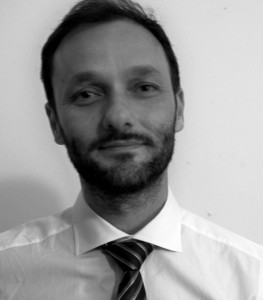 Amilcare Barca, PhD graduated in Biological Sciences at University of Salento, after his experimental training period in the Molecular Physiology Laboratory where, since 2002, he has been studying carrier proteins involved in translocation of biomolecules across cell membranes of vertebrates, investigating physiological processes and molecular mechanisms regulating carrier function and gene expression, as well as the fate of transported substrates. During his PhD in Biology and Biotechnologies (University of Salento), Dr. Barca targeted his research specifically to mRNA modulation of genes coding for oligopeptide transporters, applying a joint-approach of in silico and functional analysis, in animal and cell models. Consequently, as post-doc researcher, he investigated the cross-linking between solute uptake, gene expression and cytotoxicity triggered by extracellular stimuli, in regulation of membrane transport systems. On these basis, during 2012, in the partnership between the DiSTeBA department (University of Salento) and the Cochin University of Science and Technology (CUSAT, Kochi – 682 022, Kerala, India), within the Project 7FP People, Marie Curie Action, IRSES – Project n. 230847 PASSA, he was visiting researcher at CUSAT, given the assignment as molecular physiology expert of gene expression and enzymatic activity of systems involved in nutrient absorption through epithelial cell membranes.
Amilcare Barca, PhD graduated in Biological Sciences at University of Salento, after his experimental training period in the Molecular Physiology Laboratory where, since 2002, he has been studying carrier proteins involved in translocation of biomolecules across cell membranes of vertebrates, investigating physiological processes and molecular mechanisms regulating carrier function and gene expression, as well as the fate of transported substrates. During his PhD in Biology and Biotechnologies (University of Salento), Dr. Barca targeted his research specifically to mRNA modulation of genes coding for oligopeptide transporters, applying a joint-approach of in silico and functional analysis, in animal and cell models. Consequently, as post-doc researcher, he investigated the cross-linking between solute uptake, gene expression and cytotoxicity triggered by extracellular stimuli, in regulation of membrane transport systems. On these basis, during 2012, in the partnership between the DiSTeBA department (University of Salento) and the Cochin University of Science and Technology (CUSAT, Kochi – 682 022, Kerala, India), within the Project 7FP People, Marie Curie Action, IRSES – Project n. 230847 PASSA, he was visiting researcher at CUSAT, given the assignment as molecular physiology expert of gene expression and enzymatic activity of systems involved in nutrient absorption through epithelial cell membranes.
From 2010, Dr. Barca is conducting his research on metabolic pathways/networks of natural substrates (i.e. small peptides and metal ions) of membrane solute carriers, in neuronal and non-neuronal cells of the mammalian CNS, which biochemical properties are crucial in neurodegenerative/ageing onsets, and he’s paying particular attention to the pathophysiological interplay between different molecules. Since 2013, as a researcher at the Ospedale San Raffaele (Neuropathology Unit, section of Lecce), Dr. Barca is currently joining his research issues with translational targets such as CNS, PNS and osteochondral regeneration, by combining the study of homeostatic substrate dynamics with tissue-engineering approaches.
RESEARCH INTERESTS
- Molecular physiology of metabolic substrates (i.e. small peptides, metal ions)
- Neurodegeneration and regeneration onsets
- Regulatory mechanisms of gene expression
- Vertebrate models and protocol design
- Cytotoxicity and Cytocompatibility
- Homeostasis balance/imbalance
